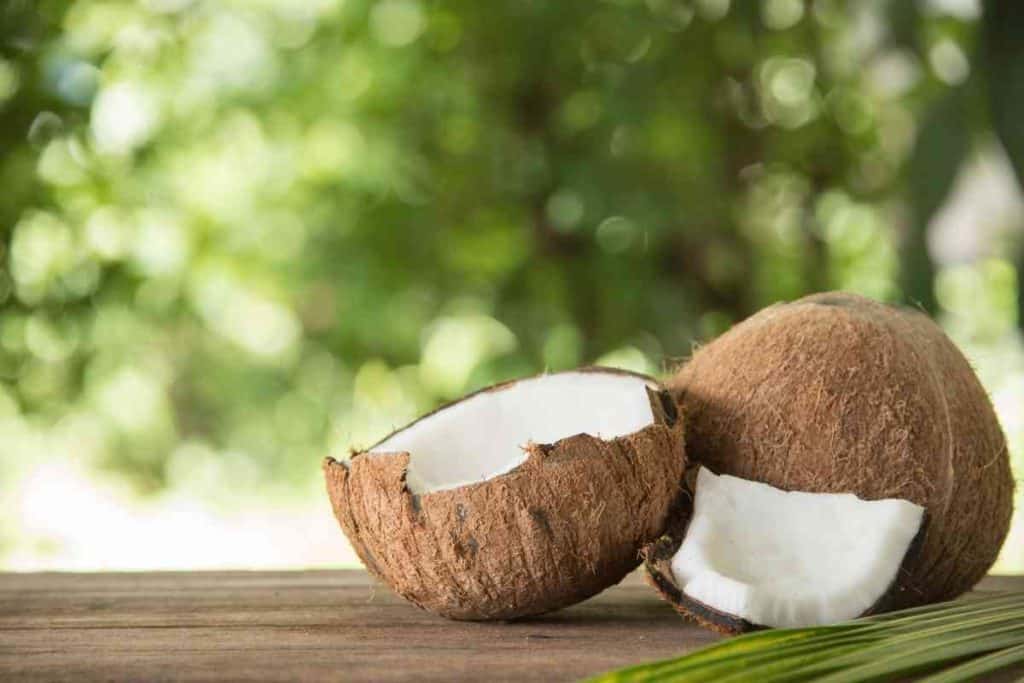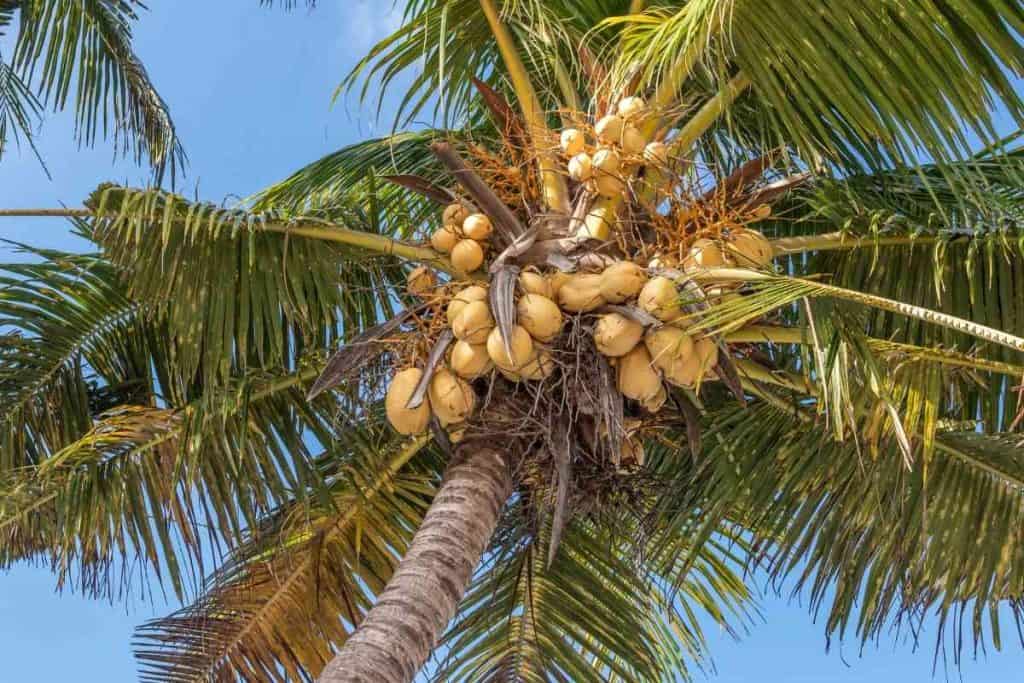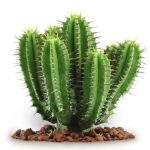The coconut tree truly is the all-giving sacred symbol. Every part of the tree is used in some way or another.
Coconut trees require plenty of sunshine and well-aired soil to thrive. They can be widely cultivated in oxygenated sandy soil just next to the shorelines because they are not impacted by salt concentration. But is coconut a tree, fruit, or a nut?
Coconuts are infamously challenging to categorize. They're very yummy and are usually eaten like fruits, but they have an exoskeleton and must be popped open like nuts. As a result, you might be confused about classifying them innately and culinarily.
That said, coconut is generally classified as a fruit, and you will learn why in this article!
Table of Contents
What are Coconuts?

Coconuts are the tropical frustration in the health community, but they are a dominant contributor to consternation in the allergic congregation.
Coconut is labeled as a tree nut by the FDA.
And, by all accounts, a food that develops on trees and has the word "nut" as its third morpheme should be aptly titled. Except if you're a biologist, a coconut is a drupe, a fruit with a rigid surrounding stratum. And, theoretically, a coconut tree isn't even a tree.
Coconut is a massive, nut-like fruit that develops on the branches of tall trees. Coconuts have tough pods and pleasant, white flesh on the inside.
See Also: Is Pepper A Fruit Or A Vegetable?
The white, crisped coconut sold in grocery stores is a packaged type of coconut fruit. Coconuts are large brown balls that must be split or chopped open to reveal the coconut meat and transparent coconut water within the shell.
To bake with coconut, you must mash your coconut first and, in many cases, sweeten it. The word comes from the Portuguese term coco, which means "grinning face," and may pertain to the three face-like gaps in a coconut fruit.
Is Coconut A Tree or Nut?
Even though the word "nut" appears in its pseudonym, a coconut is a fruit, not a nut.
Coconut belongs to the subcategory of drupes, fruits with the inside flesh and seed encased by a protective shell. Fruits such as pears, peaches, almonds, and walnuts are included.
Drupe seeds are shielded by three outermost layers identified as the endocarp, mesocarp, and exocarp. At the same time, nuts lack these outermost coating. A nut is a fruit with a protective shell that does not expand to reveal a seed.
Certain drupes and nuts can be categorized as tree nuts, which can be perplexing. A tree nut is theoretically any fruit or nut that develops on a tree. As a result, a coconut is a tree nut category classified as a drupe.
Is Coconut A Fruit?
Coconut is a collagenous one-seeded drupe, a fruit with a rigid desolate shroud that encloses the seed. A seed is a flowering plant's procreative unit. A fruit has two essential parts: the embryo root (hypocotyl) and the embryo leaves (epicotyl).
In the particular instance of the coconut, if you glance at one side of the coconut, you'll notice three porosities. A bud rises from one cavity as the coconut seed takes root. There must be endosperm or food for the plant in the seed to help the plant get started.
The endosperm is what accounts for the vast majority of the seed and, in the case of the coconut, is the delicious white stuff we enjoy.
The word "coconut" can be ambiguous since it includes "nut." According to a broad interpretation, a nut is a one-seeded fruit for which the coconut could be argued.
A genuine nut, like the acorn, doesn't immensely expand to discharge its seeds at ripening. When the fruit wall decomposes or is absorbed by an animal, the seeds are released.
See Also: Is Mushroom A Vegetable?
Why is the FDA Classifying Coconuts as Tree Nuts?

In a nutshell – pun unintended – it's because biologists classify plants in precise and intricate ways. In contrast, the FDA classifies tree nuts in broad ways as inapplicable at worst.
Tree nuts are one of the most prevalent allergens in the United States. This indicates that additives deemed to be tree nuts or variants thereof must be identified on food product tags for consumers to be informed.
The FDA must specify and describe several items as tree nuts. As a result, there is a befuddling list of species that have no food use, are not suitable for food use, and, even stranger, the term covers species that aren't even tree nuts – such as our modest companion, the coconut.
Enter the controversy: if the coconut is not a tree nut, is it risky for people with allergies to authentic tree nuts like walnuts, pecans, and almonds?
Frequently Asked Questions
Is coconut a type of plant?
Coconut (Cocos nucifera L.) is a perennial herbaceous plant that possesses fruit 12–13 times each year for up to 60–70 years, producing somewhere around 30 and 75 fruits per year. The fruit is shaped like a nut and develops on trees of different heights depending on the cultivar of coconut.
What is a coconut tree's seed?
A seed is, in essence, a 'baby plant.' If you look at one side of coconut, you will notice three black porosities known as 'eyes.' The sprout develops from one cavity. As a result, coconut has also been deemed a seed.
Can we consume coconut seeds?
The eatable globular sponge-like cotyledons of sprouting coconuts are called sprouted coconuts or coconut buds. They have a crunchy, runny texture and a slight sweetness to them. In coconut-growing countries, they are consumed fresh or as part of various dishes.
What makes coconut unique?
The coconut tree has no locations, only fronds that grow far up on the tree and are used by individuals for various purposes. Coconut trees can only be encountered in tropical climates and are most commonly found along coastlines. Coconut trees necessitate rain to thrive, and they can only develop in sandy loam.
See Also: Is Peanuts a Fruit?
Conclusion
Coconuts are a tasty and adaptable fruit that is famous worldwide.
Coconut is a popular fruit established as a drupe, not a nut, despite the title.
Individuals who react or are allergic to tree nuts can eat coconut and its products without experiencing any reaction symptoms. If you show signs of allergy or have severe allergy to tree nuts, you should consult a doctor before consuming coconut.
Notwithstanding its seed-like appearance and a moniker that mentions the word "nut," coconut is a delectable fruit.




